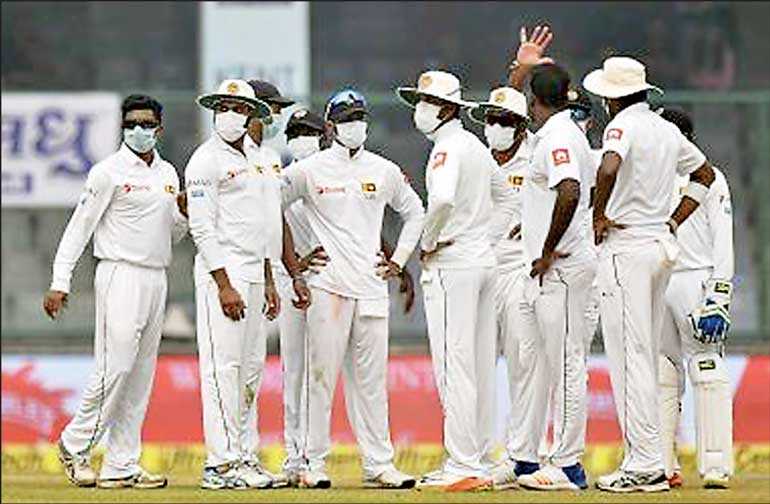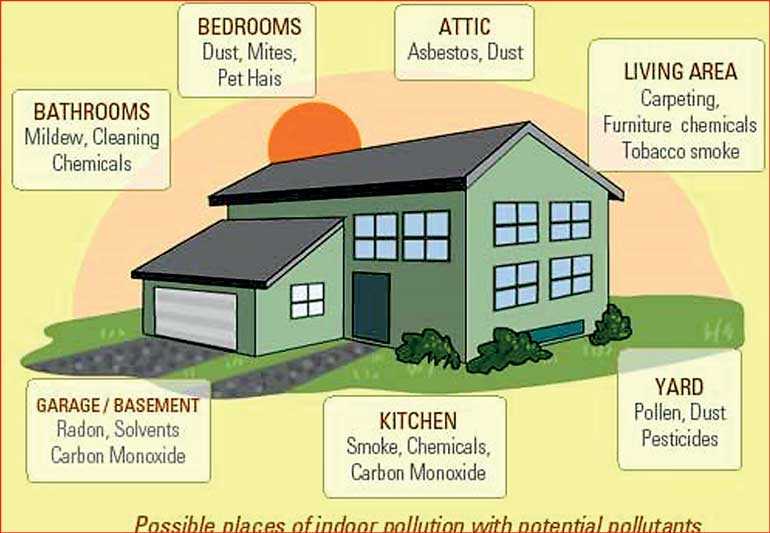Monday Feb 16, 2026
Monday Feb 16, 2026
Wednesday, 5 June 2019 00:00 - - {{hitsCtrl.values.hits}}


By Sujeewa Fernando
Today is World Environment Day, which was initiated by United Nations in 1974, to commemorate the inception of United Nations Environment Programme (UNEP). The decision to initiate UNEP was taken at the conference on Environment in Stockholm, Sweden in 1972. World Environment Day encourages action for protection of the environment. This event is widely celebrated all over the world, in more than 100 counties. This is a day to draw attention of the policy makers to conserve the environment, and for all others to get involved in activities related to protection of the environment, individually, locally, nationally or globally.
The theme for this year is ‘Beat Air Pollution’, where air pollution has become a severe environmental concern all over the world. This year the global host country is China, a country with high air pollution, where it is expected to highlight the issues in relation to the theme and support taking action to solve them. Delhi city of our neighbouring country too is a well-known city with high air pollution.
It has also been found that nine out of 10 people in the world are living under polluted atmospheric conditions, or breathing polluted air, where seven million people worldwide die prematurely each year due to air pollution and four million are from Asia Pacific region.
Air pollution was generally linked with respiratory and heart diseases, but now it has been found that it can cause, diabetes, dementia, impaired cognitive development and lower intelligence levels.
Sri Lanka emphasises on ‘Minimisation of Air Pollution through Sustainable Forest Management’ where trees absorb carbon dioxide, other pollutants and release oxygen, purifying air. Therefore by increasing the forest cover, or growing trees we can minimise air pollution. At present Sri Lanka has a forest cover of 29.7% and it is expected to increase it up to 32% by 2030. Phytoplanktons (small micro plants) in the sea too absorbs carbon dioxide and release oxygen. The main event in Sri Lanka will be held in BMICH in Colombo on 6 June under the patronage of the President and Minister of Environment Maithripala Sirisena. An ‘Environment Week’ was declared from 30 May to 5 June:
30 May - Day of Cleaning Environment and Raising Awareness on Environment
31 May - Day of Minimising Air Pollution and Its Harmful Effects
1 June - Tree Planting Day
2 June - Water and Water Sources Conservation Day
3 June - Biodiversity Conservation Day
4 June - Sustainable Land Management Day
5 June - World Environment Day
All the agencies under the Ministry of Mahaweli Development and Environment implemented many programs throughout the country through their central and regional offices to commemorate this event during the ‘Environment Week’. The agencies are Central Environmental Authority, Mahaweli Authority, Forest Department, Geological and Mines Bureau, Gem and Jewellery Authority, Gem and Jewellery Research and Training Institute, State Timber Corporation, Coast Conservation Department, Marine Environment Protection Agency, and Central Engineering Consultancy Bureau. In addition the general public, private sector, non-governmental agencies, community based organisations too joined hands in implementing programs.
Air pollution occurs when the air gets contaminated with physical, chemical or biological agents, and becomes harmful to animals, plants and human beings. Some of the main pollutants are Particulate Matter (PM) or generally known as very small dust or other particles, Carbon Dioxide, Carbon Monoxide, Ozone gas, Nitrogen Dioxide, and Sulphur Dioxide. Methane gas is emitted from waste dumps due to fermentation of bio degradable waste.
Air pollutants like carbon dioxide, methane, nitrous oxide, ozone are major greenhouse gases, which causes global warming and climate change.
Biological agents like bacteria, fungi too can contaminate the air causing many diseases.
The main cause of air pollution in the country is vehicular emissions. Industrial emissions, burning of waste, accumulation of waste, (waste dumps), construction activities, spraying of chemicals, forest fires, are some of the other causes of air pollution.
Indoor air pollution is somewhat a neglected area, which needs attention. The pollutants are two to five times more concentrated in indoors, and as many people are living indoors for longer periods during the day, it is important that we pay our attention to improve the air quality indoors. Cooking with firewood without proper ventilation, fumigating indoor unnecessarily, spraying low quality chemical fragrances, paints, chemicals, inadequate cleaning of dust can cause indoor air pollution. Unhealthy indoors can cause sick building syndrome, with symptoms like headaches, vomiting, fatigue, etc.
Air quality is degraded in the Colombo city due to vehicular emissions, industries, and dust due to constructions. Kandy and Kurunegala are two cities surrounded by mountains and rocks respectively causing accumulation of air pollutants. Most of the major cities face air pollution issues due to traffic congestions.
Outdoor air pollution can mainly be minimised by proper maintenance of vehicles, to minimise emissions, by controlling and purifying industrial emissions, minimising burning of waste specially plastics and polythene, which emits carcinogenic gasses, namely dioxin and furan.
Indoor air pollution can be minimised by improving ventilation in kitchens, and using improved cooking stoves. Minimising unnecessary fumigations and spraying of chemicals.
Vertical Forest gardens are introduced to improve air quality in cities, where plants/trees are grown on high rising buildings.
NASA has recommended 10 indoor plants which are capable of absorbing not only Carbon Dioxide but also carcinogens like, benzene, xylene and formaldehyde.
Let us take action to minimise air pollution to protect the environment and human health.
(The writer is Assistant Director, Environment Pollution Control and Chemical Management Division, Ministry of Mahaweli Development and Environment.)